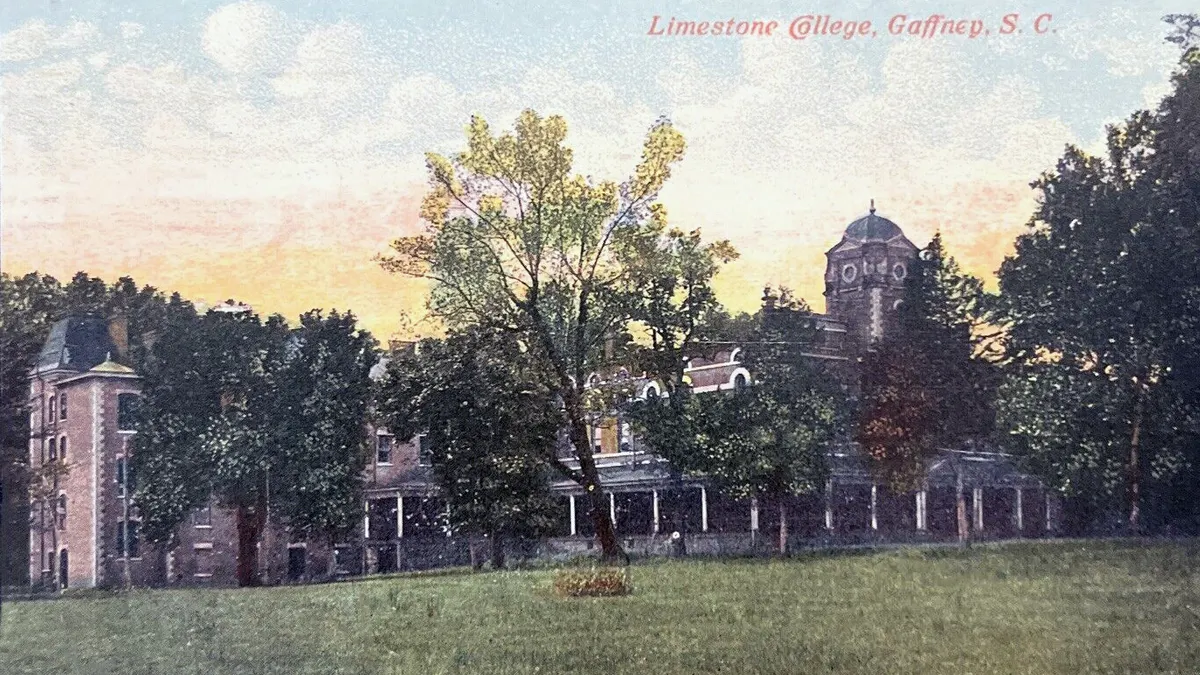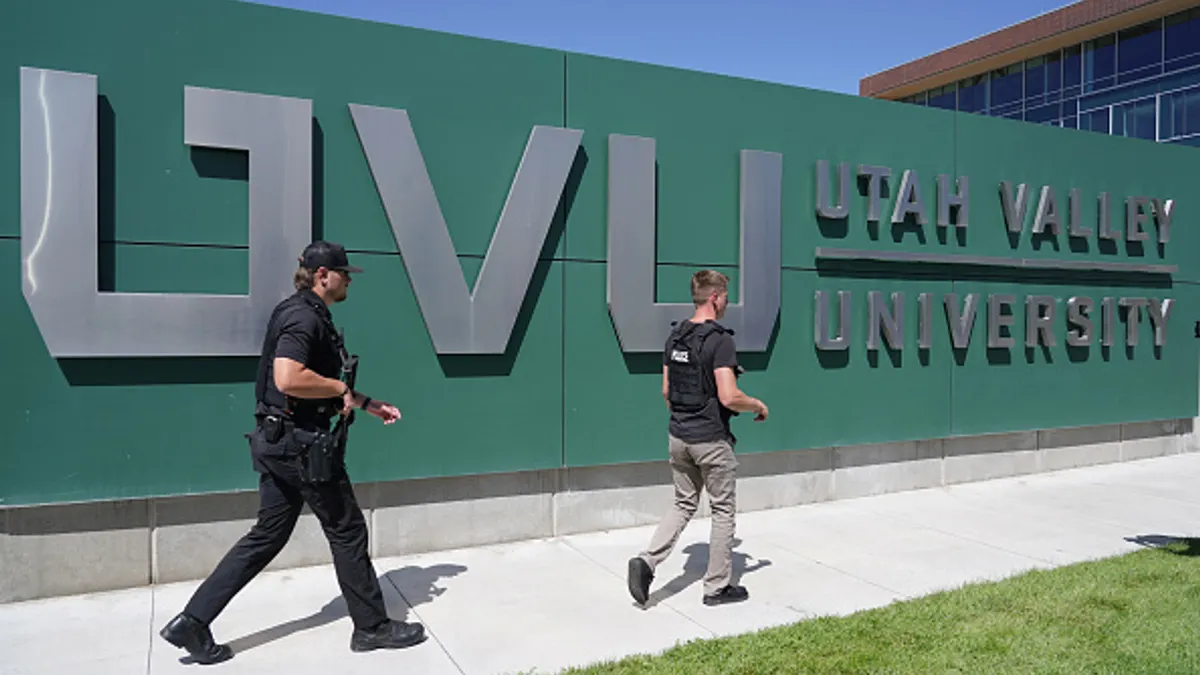Dorothy Leland had her work cut out for her in 2011 when she became chancellor of the University of California, Merced. She would be the third person to lead the six-year-old institution, the UC System's newest. Located in one of the poorest regions of the state, its goal was to expand the system's reach to more low-income, minority and first-generation students.
Broadening access is an objective of many colleges and universities, but the stakes were higher for Merced.
"When you build a new university from the ground up, you literally build everything," Leland told Education Dive last year in an interview for our 2018 Dive Awards. Merced, which has gained national attention for its quick and creative growth and for enrolling the system's largest share of low-income, first-generation and underrepresented students, was named our University of the Year.
That growth has continued, spurring the need for new space, systems and academic options. While applications to the UC System fell 3% year-over-year in 2019 — the first drop in 15 years — those to Merced rose by nearly that amount. Its enrollment gains, too, are outpacing that of the UC System, jumping 64% for Merced from 2011 to 2018 compared to a gain of 21% across all campuses.
To keep pace with the growth, the university entered a $1.3 billion public-private partnership (P3) that will double its footprint by 2020, making room for 10,000 students. It also earned its status as a doctoral research university in 2016, which will help expand research activity and graduate studies.
Leland likens it to startup culture, in which fast growth and continual change stress-test the proof of concept for a new company or idea. Leland, 71, will step down from her position next month after eight years in the role.
She won't be going far, however. She'll stay on as chair of the campus expansion P3, Project 2020, through its expected completion next year and will also remain the lead for the college's relationship with the National Park Service.
We spoke with Leland about her time at Merced and asked what's in store for the university's next leader.
This interview has been edited for brevity and clarity.
EDUCATION DIVE: Reports say you were thinking of retiring when you were approached about the UC Merced position. Why did you take it?
LELAND: There were two main factors. One was that it was a once-in-a-lifetime opportunity to help build a new UC System campus. Not many people get that. The second was the reasons why the campus was built: the students it was going to serve and the difference it could make in the greater Merced community and region. This area has historically and chronically been one of the most impoverished and educationally underserved areas of California.
You were Merced's third chancellor and were coming from a century-old institution, Georgia College. Did that difference impact how you viewed the responsibility you had in the role at Merced?
LELAND: It didn't at first, but when I arrived at UC Merced I recognized that it was very different to be in a startup environment. I became a student of startups to help understand where we were in our trajectory, what the special challenges were and to know that some of the things we were going through were quite normal. That's true of a lot of people who came to UC Merced in the early years. They came from mature, well-established institutions and suddenly found themselves in an institution that basically is building the airplane as it flies it.
How did you go about becoming a student of startups?
LELAND: I read a lot of books and articles and talked to a lot of people.
What resonated with you from that process?
LELAND: There were a few years during which I described the campus as a stage in the early history of startups that is sometimes referred to as "chaos." It's a stage in which the things you put into place to get the doors open are probably not the things that will take you to the early stages of maturity. There's a whole lot of change in a period of rapid growth and it can feel like chaos. It's a very intense environment, much more so than that of a more mature university culture.
What had to change?
LELAND: About everything.
In what way?
LELAND: I like the analogy of building the airplane as you fly it because we had systems in place to get the airplane in flight but not to carry it long distances. It was everything from our budget systems to our communications to our supply chain. Another example is the skill set needed at the management level. It covers the whole gamut of needing to put systems in place that would increase our efficiency and effectiveness in flying this plane.
How was that different from how you felt about your role at Georgia College, where you were leading an institution that was much more established?
LELAND: It was very different. Georgia College's basic operations systems were in place, but it was more than a century old. We had to take care of old buildings and renovate them; we had to figure out how to accommodate an expanding student population; and we had to figure out how to build the reputation of the institution. But we did that on the background of not having to put a thousand new things in place because they hadn't been built yet.
Merced was growing rapidly and putting new systems into place when many colleges were struggling with declining state support and enrollment. During that time, did you feel like Merced was on the same page as other institutions?
LELAND: We were on the same page with respect to figuring out how to do what we needed to do in a severely resource-constrained environment. But we were not struggling for enrollment. We were struggling for space.
Why was a P3 — in the form of Project 2020 — the chosen solution?
LELAND: We had a critical need to build new space and were looking at the traditional ways of financing capital in a public university. None of them would work at that time. It seemed to me that we needed to look outside of higher education in the public sector for models that might work for us. The P3 sector has a lot of different models in it, and so we looked at those really closely and finally settled on the model we decided to use.
What was the UC System's reaction to such a massive, integrated P3?
LELAND: Rightfully, they had a lot of questions. It was a big investment and indeed it was bigger than most public infrastructure projects inside or outside higher education. So their fiduciary responsibility was to make sure this project was in the best interest of the system and university. There was a lot of due diligence but at the end they were extremely supportive.
What advice would you have for another university looking to take on a similarly large, integrated P3?
LELAND: You need the right team to put a project like this together and to manage it once it's underway. There are multiple ways of doing a P3. You need to look at the way that works best given your goals. This project would not be for everybody, but it was just right for us.
Issues around free speech on campus and protections for DACA students also came up during your tenure. Did you expect to have to be so vocal on those points?
LELAND: The political climate was different when I left Georgia and came to Merced. It changed significantly with the last election. Our undocumented students increasingly were put at risk because of the politics of the nation. So yes, it was really important to do what I could to ensure that the civil rights of these students were protected — they're my students, and they richly deserve the education they are receiving. It's been a difficult time.
That's the same with free speech. A significant number of young people believe the climate of their campus is more important than defending free speech. As the leader of a public institution, I'm obligated by law to defend free speech. So that creates quite a tension between administrators in a public university or college and a significant portion of the student population.
What can college leaders do to walk that line?
LELAND: We also have free speech. Speech that's hateful, we can condemn. We can use our position to get that message out. We are also educators and the history of case law on the First Amendment is quite interesting and informative. Students can learn, for example, that during the civil rights movement, were it not for the First Amendment a number of civil rights leaders would have been found guilty of a felony. Those felonies were overturned because their speech and actions were protected by the First Amendment.
Simply educating students about the history of the First Amendment and how throughout history the attempt to suppress the speech of the opposition has had undesirable consequences for causes students believe in.
What's next for Merced, and what do you want to see in the next leader?
LELAND: The next leader will have a wonderful opportunity to work with the campus to plan the next phase of development in terms of academic offerings, student support and success, and campus growth. It's a good time for a new leader to come in. We'll have closed out this particular phase of growth and the campus will be hungry to begin thinking about what's next and how we get there. The new leader is going to be somebody who can lead the campus in that conversation.
What do you think their challenges will be?
LELAND: Our student body is already diverse but we have work to do in our staff and faculty, so that will continue to be a challenge and an important initiative. We already well exceed national averages for graduation rates of first-generation, low-income and underrepresented minorities, but we want our rates to be as high as the oldest and most prestigious UC System campuses. And in an era of continued shrinking state support for public higher education, the new leader will also have to focus on bringing nonstate resources into the institution.
What are you most proud of?
LELAND: The amazing success of our students and the things they are going on to do as alumni, and the remarkable faculty we've been able to hire. We have developed at an amazing pace as a research university that is recognized in the rankings and you have to credit the faculty for that.
















